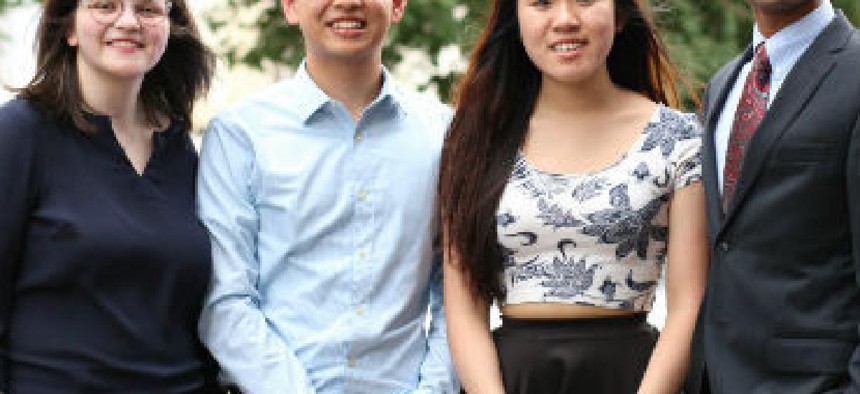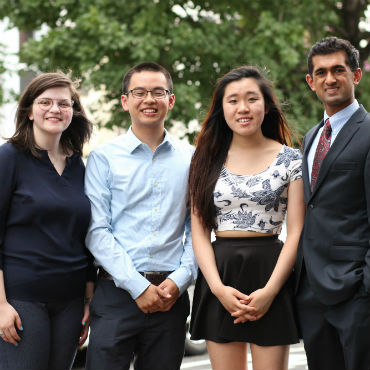Students recruiting students into federal tech

Steve Kelman checks in with the Coding it Forward fellowship program.

The Coding it Forward board (l-r): Rachel Dodell, Chris Kuang, Athena Kan, Neel Mehta. (Photo credit: Karen Su)
If I told you that over 850 college students -- many from top colleges such as Harvard -- have applied for tech internships in the government this summer, what would your reaction be?
If you're like me, your first thought would be, "That can't be true." How can the government, with its stodgy reputation, boring office spaces, lack of money to pay students -- and, generally, zero cool factor -- possibly compete with glamorous tech jobs in the private sector?
But that is indeed the case, thanks to a student-run organization called Coding It Forward, founded only a year ago by Harvard and Wellesley undergrads. The top 10 sources of applicants include such elite schools as Harvard, Carnegie Mellon, MIT, Berkeley, and the University of Chicago. The 2018 applicant pool is majority female, breaking the dominance of males in Silicon Valley.
The moniker "Coding it Forward" is a play on the idiom "paying it forward." (For those, like myself, who are too old or out of it to be familiar with the term, co-founder Chris Kuang explained that it means to respond to help or a good deed done on your behalf by providing similar assistance to someone new, rather than "paying back" the person who helped you.)
I spoke with Kuang, a Harvard sophomore majoring in applied math, and one of Coding it Forward's current directors, about how the organization got off the ground. Interestingly, Kuang is not really himself a techie, though he has taken the introductory computer science course (Harvard's most-popular offering). He is more interested in civic engagement and social betterment, and has been active in the Institute of Politics at the Kennedy School, which is for students interested in politics and public service.
"Much like the founder of Teach for America was not a teacher when she started," Kuang explained, "I think we … saw an opening to inspire a new generation of college students and recent graduates to consider new, impactful outlets for the skills they already had."
The idea for an organization grew out of the annual Grace Hopper Celebration of Women in Computing, the largest event for women in tech, which several Harvard students attended. At the conference there was an "amazing" speech by former federal CTO Megan Smith appealing for technologists to work in public service, as Hopper herself had. "But at the booths afterwards, all the students went to industry or startup booths; the government booths were very poorly attended," Kuang recalled. "We recognized there were lots of barriers to entry -- students didn't know where to apply, or whether there were any opportunities. Since the barriers were high for individual students, we wanted to make it easier for them."
The original plan was not to create a fellowship, he said. "We started as a blog, to show what other students had done in civic tech. … In two months, with the help of social media, over 800 students had joined the group."
A turning point for the group came because two of the co-founders, computer science majors Athena Kan and Neel Mehta, had taken a course offered at the Kennedy School by Nick Sinai, former deputy CTO in the White House, called Technology and Innovation in Government, which connected students in the course with interesting tech projects in government. "Through the experience working for a government client, Athena and Neel saw how meaningful such work could be," Kuang said. Thus the idea of actively organizing student internships in government was born.
Sinai put Mehta in touch with Jeff Meisel, the Census Bureau's chief marketing officer and a former Presidential Innovation Fellow, due to their mutual interest in open data. During a conversation, the topic turned to the difficulty of attracting students to government tech work; Meisel had tried to organize a data science internship the previous year, but it attracted no student interest. Mehta and Meisel agreed on the idea of a pilot at Census, co-sponsored by Coding it Forward. In just a few months, the program was off the ground with 14 students.
So how is this group getting so many students to apply for tech internships in the government? Coding it Forward has crafted a package for the internship that is modeled on what Silicon Valley companies offer as part of summer jobs for students, going far beyond just plopping a student down in an office and forgetting about them.
The most important part of the package is that work needs to be real projects that address real societal problems and require thought to solve. When the Harvard students initially looked online for government internships on USAJOBS, what they saw was jobs "installing Sharepoint in agencies," Kuang said.
This was most definitely what they did not want. An early decision, for this reason, was to call these jobs "fellowships" to emphasize the uniqueness of the program and its offerings and how it was different from traditional internships.
Second, as in the Silicon Valley, the founders wanted each fellow to have a mentor to share experiences and advice about "how they got where they were." They also added an orientation at the beginning to teach students, most of whom knew essentially nothing about working in government, some of the tricks of the trade.
One could easily have imagined that government leaders might not change to accommodate some 20-year-olds. But the Census folks listened and changed how they had done business before – good job, government folks.
Third, they wanted the fellows to have a chance to meet civic tech leaders in Washington to expand their knowledge and networking credentials. They added a "demo day" at the end of the summer where students could present for agency leadership what they had accomplished, attended by the chief of staff for the Secretary of Commerce and the Department's White House liaison, as well as Census leadership.
"They were all blown away about how much people were able to accomplish in 10 weeks," Kuang said.
One project was to develop an online resource for small businesses and to use census data to make decisions. "People couldn't figure out how to use the data," Kuang recalled. "The fellows interviewed small business owners to understand their experiences – and then they could design iteratively and implement a user-centered way to access targeted data." (That tool is now on the Census website.)
Finally, they wanted to include social events, such as providing information about museum exhibits or organizing bike rides along the Potomac on nice days. The fellows also all lived together. The idea was to create a community that would last beyond the summer. Just last weekend, Kuang told me, some fellows living in the Bay Area came to a conference in Boston and looked up Coding it Forward friends.
Going forward, one issue is whether host agencies have enough in-house tech talent to mentor fellows. Mentors at Census had subject matter expertise in areas including data science, software development, product management, and differential privacy. Having such in-house experts is a constraint for the expansion of the program.
It would be a mistake to assume that all the people applying for these fellowships are moved by the idea of public service. Kuang said he thinks more applicants are moved by the "tech" part of civic tech than the "civic" part. But it would also be a mistake to assume such motivations are entirely absent.
Kuang himself, whose parents are immigrants from China, told me that "America has given my family and me so much that I really want to give back." He told me about fellows who told him that their work helping the whole country was so much more satisfying than "developing apps for the top 5 percent."
This summer, the fellowship will expand from Census to two additional agencies, the State Department and HHS. Instead of 14 students, there will be 30-50. The students did not recruit new agencies -- the agencies came to them, many based on an FCW.com article on the group and some through contacts with Census.
Coding it Forward considered agencies that could present interesting projects for students; that had funding for multiple fellows, on the view that single fellows would be isolated and community couldn't be built the same way; and that promised the presence of a senior-level champion within the agency. From the 15 agencies that came forward, they chose three, partly to avoid expanding too fast.
Will government end up recruiting any of these people as full-time government employees?
"We hope that people leave with an appreciation of both parts of the phrase 'civic tech,'" Kuang said. There is a consensus that for students interested in civic tech, their first job should likely still be in a tech company, because that's where they will hone their tech skills best. But Kuang is hopeful that some will return to government later on, either as full-time employees or in a stint with the U.S. Digital Service or 18F.
"It may be a long and winding road, but eventually I think our fellows will find their way back," he said. "Long-term jobs are only part of what we are trying to do. We also want to make a contribution to helping agencies think about a digital strategy."
And, he added, "Even if their only impact were the projects fellows built, that is still so meaningful."
This is yet another example of the innovative technology ecosystem emerging around government, which I have highlighted in a blog late last year on USDS and 18F. When the new organization had just been launched, Nick Sinai at the Kennedy School had had a friend in Census who was looking for tech interns. The second year of the organization, they followed the USDS playbook for selecting agency partners, involving having interesting projects to work on and executive buy-in, in screening agencies interested in participating in the fellowship. This summer, Nava and Ad Hoc, two of the new innovative entrants to the government marketplace, will be cheering on Coding it Forward as well.
These kinds of connections reinforce each other, and suggest a view that, to use Silicon Valley-ese, things are changing in the government space.
NEXT STORY: FBI taps veteran agent to head IT shop


